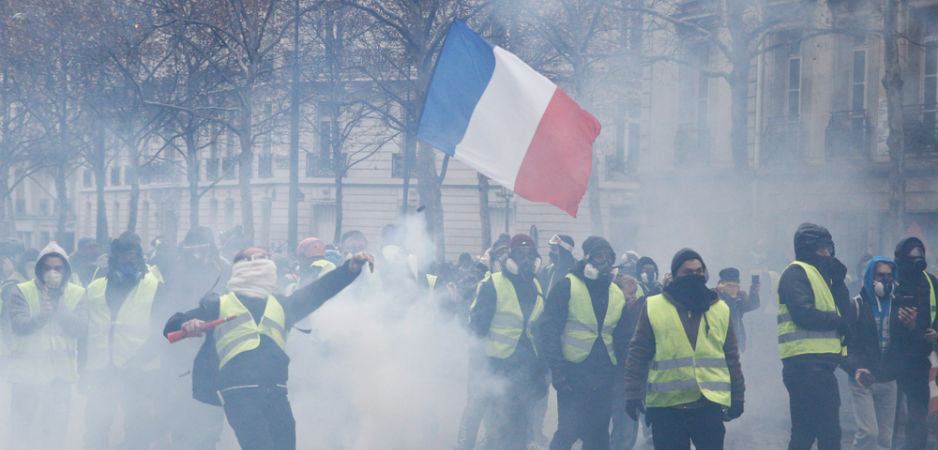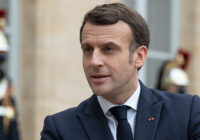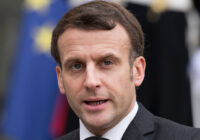By displaying a tin ear to the concerns of the gilets jaunes protests, President Emmanuel Macron remains fatefully out of touch.
A new revolution is on its way in the country that invented the guillotine. A new emperor, more at home at the gilded palaces of Rothschild and the winding corridors of power, is now asking his people to eat cake when they often can’t afford a simple baguette. French President Emmanuel Macron is woefully out of touch and his people have taken again to the streets as a result. Across France, a tired police force of 89,000 will be facing mobs on December 15, a fifth consecutive weekend of protests. A top police chief has declared that this level of violence is unprecedented. On December 5, mobs burned down a famous law firm, two high schools and several cars in Paris. They looted shops in the historic Place Vendôme and Rue de Rivoli.
The “gilets jaunes,” as the protesters have come to be known because of their high-visibility yellow vests, were joined by high school students, road transport unionists and farmers. On December 3, 200 high schools shut down after students rallied to protest against the latest education reforms. Road transport unions, the General Confederation of Labor (CGT) and the Workers’ Force (FO) union syndicates have called for a general strike. These mass protests are testing the mettle of a feckless government.
The gilets jaunes and other protesters have united out of disgust for Macron’s arrogance. Some hold the view that he suffers from pervers narcissique. In simple English, Macron could best be described as a smooth-talking narcissistic pervert. When abroad, the French president conveys an image of a liberal and progressive leader who is holding back the mighty tide of populist nationalism, saving France and Europe from disaster in the process. At home, this image does not quite wash. For too many, he represents France’s out-of-touch, elite, business school-trained political upper class that can no longer hear or empathize with the people’s concerns.
Macron came to power in 2017 claiming to be an outsider. His La République En Marche! movement was supposed to liberate France from the shackles of party politics. Literally meaning “the republic on the move,” the party has now fizzled out to give way to a revolution on the march. The protests have led to a climate of fear in the country. Even though the government has caved in and withdrawn fuel tax hikes that sparked the protests, popular unrest continues. This plays into the hands of Marine Le Pen’s renamed far-right National Rally party, which now has a much better shot at the Élysée.
THE CLASH OF THE CLASSES
Once the gilets jaunes movement started, testimonies of thousands of people have been pouring out on social media. One of these has gone viral. Paul is a 40-year-old delivery driver who lives in the north of France. He earns the minimum salary of €1,184 ($1,337) a month. He has three children and a wife, who doesn’t work. They live hand-to-mouth, with no money left after food, utility bills and rent. He is not poor enough to get full state benefits and not rich enough to lead anything but a hardscrabble life. The €600 per month that Paul gets in social benefits is barely enough for his family to get by. Paul’s family may not be living in heartrending poverty seen in the developing world, but this sort of dilution of living standards goes against France’s ideals.
Macron’s reforms seem to be hitting people like Paul the hardest. Some of the ills of the Anglo-Saxon system have infected France too. The recently disgraced Carlos Ghosn, the chief executive of the leading French car manufacturer Renault, was earning 1,200 times more than the lowest-paid worker at the company and remains in his job despite charges of financial misconduct. It comes as no surprise that gilets jaunes are looting, pillaging, plundering and burning shops selling luxury items and cars. Muriel Pénicaud, the minister of labor, has admitted that jobs simply do not pay enough for lower classes to make ends meet. She is planning to reverse this problem by decreasing the cost of social contributions and increasing the minimum wage.
French police used crowd control and anti-riot tactics during demonstrations in Paris in November and December 2018 that caused physical harm to peaceful demonstrators, including high-school students, and journalists.
Daily Brief: https://t.co/Ty3JuxQWHc pic.twitter.com/nGKAN7Vpam
— Human Rights Watch (@hrw) December 14, 2018
France’s convoluted laws and infamous red tape do not help. On December 5, bakers in Normandy went to court for selling bread seven days a week. French law imposes one day off per week for all businesses, facing a €3,000 penalty if they don’t comply. The bakers argued that if they respected the law, they would have to fire two of their employees and close their shop. In light of such trying economic circumstances, restrictive laws have to go. They were once drafted with good intentions but now pave the way to a Kafkaesque hell.
Parisians from the posh 8th and 16th districts have called upon the army to protect their elegant Haussmann mansions. They accuse gilets jaunes of being a disorganized mob engaged in social terrorism. So far, the government has been unable to protect the wealthy neighborhoods, sparking fear among France’s elite. At heart is a clash over a vision for France. The richer sections of society want to make France more like the US and the UK. For them, the Rothschild banker is the perfect president trimming down a bloated French state à la Margaret Thatcher.
For others, this is the wrong way forward. They want to reinstate higher taxes for the super wealthy, if not the wealthy. Marielle de Sarnez challenged Macron in parliament, declaring that it is time to rewrite the social and civic contract in favor of the struggling masses. It is important to remember that this discontent with the government is not new. Both Nicolas Sarkozy and François Hollande were failed one-term presidents who fell prey to popular disillusionment. Macron rose to power exploiting that sentiment.
Ironically, he was the one who extended working hours in 2015 as minister of the economy. Emmanuel Valls, then-prime minister, relied on Article 49.3 of the French Constitution to pass the law without a vote. Macron’s new reforms aimed at attracting capital back to France to “unlock economic growth” are old wine in a new bottle that elites have been trying to sell for years. Those not so privileged are pushing back against this very phenomenon by the proverbial French method of taking to the barricades.
END OF PROJECT MACRON
Emmanuel Macron was always overrated by the media, particularly in Britain and America. He won 24% of the vote in the first round of elections in 2017, with Le Pen coming second with 21.3%. In the second round, the French rallied behind Macron as they did behind Jacques Chirac in 2002. On both occasions, they wanted to keep the far right from coming to power, but at the last election, Marine Le Pen did much better than her father, former National Front leader Jean-Marie Le Pen. Her party gained 50% more votes than it did in 2002.
By displaying a tin ear to the concerns of the gilets jaunes, Macron may have signed his political death warrant. The president treated the movement as another strike, which are common in France, but failed to realize that this time the mood was more sombre. In contrast to Sarkozy, who faced 100 days of thugocracy in the outskirts of Paris in 2005, the gilets jaunes marched down the Champs Élysées and seized the Arc de Triomphe — the monument to modern France. This is a national protest of les sans-culottes who are asking for dignity, equity and social recognition they have lost in a system dominated by the top 1%. The gilets jaunes are not typical French rioters. They are ordinary citizens pushed against a wall who have been crushed by every president since Chirac.
Macron has two ticking time bombs on his hands: social unrest because of growing inequality and economic transition due to environmental concerns. Nicolas Hulot, the former minister for ecology, tried unsuccessfully to address both these problems. He took the view that the government must reconcile “the end of the world with the end of the month.” That is what Macron promised to do, but so far Project Macron has failed completely and irrevocably.
To understand Project Macron, one has to study modern France. La grande nation prides itself as the home of liberty, equality and fraternity. Sadly, the reality differs from this ideal. In comparison to the United States, education is almost free. However, as Atul Singh wrote in Fair Observer last year, the top “positions are monopolized almost entirely by énarques [graduates of the National School of Administration] and graduates of other grande écoles, the top French schools.” He points out how between 1987 and 1996, only 5.5% of énarques “hailed from working-class backgrounds” in contrast with graduates of Canada’s top schools where the number was 25-30%. As per Singh, “elite French schools perpetuate ‘a tiny caste-like aristocracy of wealth and brains’ that would make inbred Brahmins proud.” Success in France is only available to a few lucky ones who manage to get into the driving seat. Consequently, they make the system serve them, and not vice versa.
Today, France offers little social mobility. It suffers from archaic elitism that is not only unjust but also thwarts innovation. The French educational system does not teach or reward critical thinking. Instead, it teaches students to mold themselves into the system and become cogs in an economy of privilege. Outsiders have little room to breathe. As a result, the French are immigrating in large numbers even to former British colonies such as Singapore and Hong Kong.
France has a two-tier system of higher education. Public universities comprise the first, obliged to admit everyone with a high-school diploma but offering a low standard of education. The prestigious grandes écoles form the second tier. Created in the Napoleonic age, they were supposed to foster a meritocratic elite to run the French state. Out went l’ancien régime with its inherited privilege, in came the Napoleonic men of merit.
Over time, these elite schools have ossified and created an incestuous elite of their own. They judge merit through examinations that might be rigorous but reward conformity. More importantly, alumni of the grandes écoles have a stranglehold on French politics, business, finance and diplomacy. Those who attend elite schools are guaranteed top jobs for their lifetime. Over 80% of top executives in France’s 40 biggest companies — including Emmanuel Macron — come from just three of these schools. That might explain his inability to relate to modern-day sans-culottes who form the bedrock of the gilets jaunes movement.
Surviving in the Desert
The gilets jaunes are protesting because they are fed up with the elite that Macron belongs to. They no longer want to be bossed about by the énarques and want ladders to the top echelons of French society. Macron does not understand their concerns. His knee-jerk response is to throw cash at the problem. Despite concessions to increase the minimum wage by €100, cancel taxes on extra working hours as well as the latest tax imposed on low-income pensioners, the gilets jaunes are hungry for more meaningful changes within governmental institutions and structures to allow their voices to be heard. Macron has failed to address the two main issues gilets jaunes care about: more social mobility and a sustainable minimum living wage.
 There is an inherent link, historically, between anti-fiscal protests and the withdrawal of public services, according to the historian Mathilde Larrère. For people living in the countryside and the outskirts of large cities, it is a daily battle to find doctors, hospitals, centers for public services such as social security or taxes, nurseries and post offices. Without a doubt, the increase in the fuel tax hit a sensitive nerve. According to a recent report, 11,300 municipalities lack doctors and other medical services. They have been labeled “medical deserts.” So under the underlying anti-fiscal protests, the gilets jaunes express anger toward the disparity between what they pay in taxes and what they perceive in terms of public services — which is not much.
There is an inherent link, historically, between anti-fiscal protests and the withdrawal of public services, according to the historian Mathilde Larrère. For people living in the countryside and the outskirts of large cities, it is a daily battle to find doctors, hospitals, centers for public services such as social security or taxes, nurseries and post offices. Without a doubt, the increase in the fuel tax hit a sensitive nerve. According to a recent report, 11,300 municipalities lack doctors and other medical services. They have been labeled “medical deserts.” So under the underlying anti-fiscal protests, the gilets jaunes express anger toward the disparity between what they pay in taxes and what they perceive in terms of public services — which is not much.
What is also at stake is people’s participation in the making of political decisions. For the first time, protesters voice the thorny issue that challenges directly institutions. Condemning a political class that is not representatives of its people, gilets jaunes firmly demand the creation of a référendum d’initiative citoyenne — a referendum based on the people’s initiatives. Already in place in certain European countries and very popular in Switzerland, this system allows parliament to review a project of law if a certain amount of signatures is reached. In addition, the gilets jaunes also demand the power to revoke a political representative or change the constitution based on a citizen-led referendum.
The debate between representative or direct democracy goes back to the 18th century. Montesquieu and Rousseau opposed each other on the issue. The gilets jaunes’ frustration echoes what Rousseau wrote regarding the social contract, namely that citizens become the slaves of parliamentarians once elected. The demands of today’s protesters echo those made during the French Revolution and should be listened to, because they deal with the essence democracy and citizens’ rights. When the future of the gilets jaunes movement is uncertain after the terrorist attack in Strasbourg on December 11, one would hope that politicians have listened and will act accordingly. Otherwise people will flock back in the streets.
The rallying cry Tous à la Bastille! — everyone to the Bastille — that has swept social media evokes 1789, the year the royal prison fell to a revolutionary mob. The gilets jaunes are harking back to those days of resurrection. Hopefully, this time posh Parisians will not remain as out of touch as the French royalty of yore.
*[Updated: December 17, 2018 at 23:00 GMT]
The views expressed in this article are the author’s own and do not necessarily reflect Fair Observer’s editorial policy.
Support Fair Observer
We rely on your support for our independence, diversity and quality.
For more than 10 years, Fair Observer has been free, fair and independent. No billionaire owns us, no advertisers control us. We are a reader-supported nonprofit. Unlike many other publications, we keep our content free for readers regardless of where they live or whether they can afford to pay. We have no paywalls and no ads.
In the post-truth era of fake news, echo chambers and filter bubbles, we publish a plurality of perspectives from around the world. Anyone can publish with us, but everyone goes through a rigorous editorial process. So, you get fact-checked, well-reasoned content instead of noise.
We publish 2,500+ voices from 90+ countries. We also conduct education and training programs
on subjects ranging from digital media and journalism to writing and critical thinking. This
doesn’t come cheap. Servers, editors, trainers and web developers cost
money.
Please consider supporting us on a regular basis as a recurring donor or a
sustaining member.
Will you support FO’s journalism?
We rely on your support for our independence, diversity and quality.






